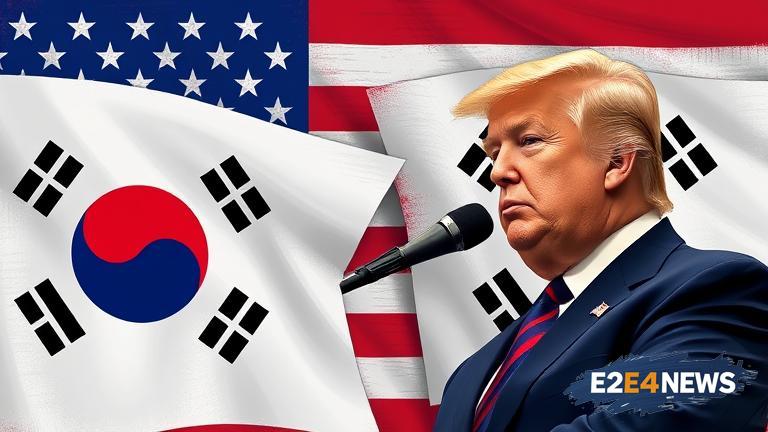In a recent move, President Trump has announced that the US will impose a 15% tariff on certain goods from South Korea. This decision has sparked concerns over the potential impact on trade relations between the two countries. The tariff, which is set to take effect immediately, will apply to a range of South Korean products, including electronics, machinery, and textiles. The move is seen as a response to South Korea’s perceived unfair trade practices, which have been a point of contention between the two nations for some time. The US has long accused South Korea of imposing barriers to American exports, and this tariff is intended to level the playing field. However, the move has been met with criticism from South Korean officials, who argue that the tariff will harm their economy and lead to job losses. The South Korean government has vowed to take retaliatory measures, which could escalate the trade tensions between the two countries. The US is one of South Korea’s largest trading partners, and the tariff could have significant implications for the country’s economy. The move is also likely to have an impact on American consumers, who may see prices rise for certain South Korean products. The tariff is part of a broader effort by the Trump administration to renegotiate trade agreements and protect American industries. The administration has been critical of what it sees as unfair trade practices by other countries, and has imposed tariffs on a range of products from countries including China, Canada, and Mexico. The move has been welcomed by some American businesses, who argue that it will help to protect their interests and create jobs. However, others have expressed concerns that the tariff will lead to a trade war, which could have negative consequences for the global economy. The situation is being closely watched by economists and trade experts, who are warning of the potential risks of a trade war. The US and South Korea have a long-standing trade agreement, which has been in place since 2012. However, the Trump administration has been seeking to renegotiate the agreement, which it sees as unfair to American businesses. The tariff is seen as a negotiating tactic, intended to pressure South Korea into making concessions. The move has also sparked concerns over the potential impact on the global economy, which is already facing significant challenges. The International Monetary Fund has warned of the risks of a trade war, which could lead to a decline in global trade and economic growth. The situation is being closely monitored by other countries, which are watching to see how the situation develops. The EU, China, and other major trading partners have all expressed concerns over the potential impact of the tariff. The US is one of the world’s largest economies, and its trade policies have a significant impact on the global economy. The move is also likely to have an impact on the US economy, which is already facing significant challenges. The tariff could lead to higher prices for consumers, which could have negative consequences for economic growth. The situation is complex, and the outcome is uncertain. However, one thing is clear: the US and South Korea are at a critical juncture in their trade relations, and the consequences of this move will be closely watched by economists, trade experts, and businesses around the world. The US and South Korea have a long history of trade cooperation, and it is hoped that the two countries can find a way to resolve their differences and avoid a trade war. The move has sparked a heated debate over the merits of protectionism versus free trade, with some arguing that the tariff is necessary to protect American industries, while others argue that it will harm the economy and lead to job losses. The situation is a reminder of the complexities of international trade, and the need for careful consideration and negotiation to avoid conflicts and promote cooperation. The US and South Korea must work together to find a solution that benefits both countries and promotes economic growth and cooperation.
